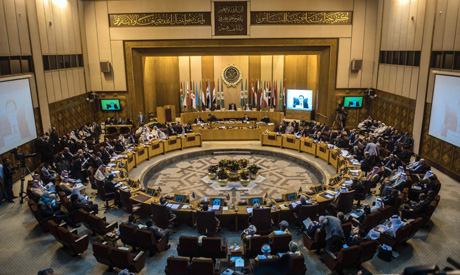
A general view shows a meeting of foreign ministers at the headquarters of the Arab League in the Egyptian capital Cairo, on March 7, 2017 AFP
The current Arab situation is not ready for Syria's return to the Arab League, Secretary General Ahmed Aboul-Gheit said in a press conference following the 147th annual Arab League meeting in Cairo Tuesday.
Aboul-Gheit said in a joint press conference with Algeria's foreign minister said that the issue was off the table and wasn't even a matter for discussion on a bilateral basis.
The Arab League meeting saw the absence of several foreign ministers, including those of Saudi Arabia, Kuwait, and others.
It's unclear what triggered these absences from the Cairo meeting.
"International and regional powers were the ones dealing with Syria's status and there has been a wish that was being expressed that an Arab contribution is included in this matter, but this is only accomplished through an Arab-Arab harmonisation on the situation there," Aboul-Gheit said, pointing that the issue might be discussed in the upcoming Arab Summit.
The suggestion of Syria returning to the League was first brought up by Iraqi Foreign Minister Ibrahim Al-Gaafari, who said that a Syrian comeback was an "extremely important issue."
"Arab alienation to Syria should end," he said, saying such estrangement impacts most those of the Syrian nation who need help from the Arab League.
He called for a review of an earlier order by the Arab League to ban Syria from participating in the activities of the League.
Syria had its membership in the League frozen in November 2011, with the Syrian government crackdown on opposition protests during the Arab Spring cited as the reason.
Libya: New meeting
On Libya, Aboul-Gheit said that a quadrilateral meeting aiming to push peace efforts in Libya with a first time participation by the European Union, the Arab League, African Union and the United Nations might be held before the end of March.
Foreign ministers issued a statement wherein they reiterated their commitment to the respect of the unity, sovereignty and safeguarding of Libyan lands.
They also underlined their objection to foreign intervention, except upon the request of the Presidential Council of the Libyan National Accord Government.
Cairo has repeatedly announced its commitment to support a political solution in Libya, calling on the Libyan parliament and Presidential Council to refuse any foreign intervention and commit to reaching a political solution.
Last month, a trilateral meeting of the foreign ministers of Egypt, Tunisia and Algeria was held in Tunis to discuss the situation in Libya, with the representatives of the three countries releasing a statement of support for a Tunisian declaration on comprehensive political reconciliation in Libya.
The declaration included six points that reiterated the rejection of foreign military or political intervention in Libyan domestic affairs.
The Algerian minister for Maghreb, African and Arab League affairs, Abdelkader Messahel, said that his country doesn't interfere in the domestic affairs of other countries, particularly Libya
"There is no single Algerian solider fighting in Libya," he said, accentuating his support for Libyan stability and a return of vital apparatuses, a vacuum of such aids terrorism and terrorists.
Palestine still a main issue
On Palestine, Aboul-Gheit called on everyone to not preempt events in dealing with the stances of the new US administration lead by President Donald Trump, affirming the League's commitment to the two-state solution.
Trump has been a firm supporter of recognising Jerusalem as Israel's capital and refraining from pressuring it into making deals with the Palestinians.
Speaking Wednesday, Palestinian Foreign Minister Riyad El-Malki said the Arab League underlined its commitment to the Arab Peace Initiative issued in 2002, stating there was no intention of adjusting the initiative.
El-Malki added that Arab foreign ministers affirmed an adamant and powerful position on the importance of resolving the Palestinian crisis via an independent state on the borders of 1967 with East Jerusalem as its capital
He added that Palestinian leaders were currently working with all Arab states on final preparations for the upcoming Arab League Summit in Jordan, expressing his hope that the summit would witness a bolstering of the Palestinian role.
He noted that ministers underlined the dangers posed by Israeli settlements, along with several controversial bills passed recently by the Israeli Knesset.
Short link: